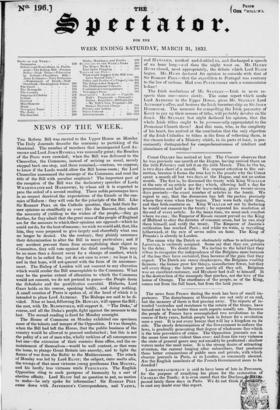NEWS OF THE WEEK.
THE Reform Bill was carried to the Upper House on Monday The Daily Journals describe the ceremony as partaking of the theatrical. The number of members that accompanied Lord AL- THORP and Lord JOHN RUSSELL was unusually great; the Benches of the Peers were crowded; when the Bill was delivered to the Chancellor, the Commons, instead of retiring as usual, merely stepped back one step, and there remained,—curious, we suppose, to know if the Lords would allow the Bill house-room; the Lord. Chancellor announced the message of the Commons. and read the title of the Bill with peculiar emphasis ! The important part of the reception of the Bill was the declaratory speeches of Lords WHARNCLIFFE and HARROWBY, by whose aid it is expected to pass the ordeal of a second reading. These noble personages have in no respect deceived the expectations of the friends or the ene- mies of Reform : they will vote for the principle of the Bill. Like Sir ROBERT PEEL on the Catholic question, they hold their for- mer opinions as steadfastly as ever; like the Baronet, they admit the necessity of yielding to the wishes of the people,—they go further, for they admit that the great mass of the people of England are for the measure to which their opinions are opposed—which he could not do, for the best of reasons; we wish we could add, that, like hide, they were prepared to give largely and cheerfully what can no longer be denied. On the contrary, they plainly announce their determination to alter the Bill in many particulars ; and if any accident prevent them from accoinplishing their object in Committee, they will vote against the third reading. This may be no more than a decent cover for a change of conduct, which they feel to be called for, yet do not care to avow : welope it is, and in that hope, will not quarrel with the form of its announce- ment. Tile Bishop of London will not consent to any alteration which would render the Bill unacceptable to the Commons. What may be the precise extent of alteration to which the Commons would not consent, we do not pretend to guess—the People deem- the Schedules and the qualification essential. Hitherto, Lord GREY holds on his course, speaking boldly, and doing nothing. A small creation of Peers is spoken of, at the head of which it is intended to place Lord ALTHORP. The Bishops are said to be di- vided. Nine at least, following Dr. HOWLEY, will oppose the Bill; the rest, with Dr. BLOOMFIELD, will support it. " The Duke," of course, and all the Duke's people, fight against the measure to the last. The second reading is fixed for Monday sennight.
The House of Commons on Monday exhibited one specimen more of the talents and temper of the Opposition. It was thought, when the Bill had left the House, that the public business of the country would be allowed to proceed undisturbed ; but this is not the policy of a set of men who, wholly reckless of all consequences but one—the extrusion of their enemies from office, and the re- instatement of themselves—would be well content, so that were the issue, to plunge Great Britain into anarchy, and to light the flames of war from the Baltic to the Mediterranean. The attack of Monday was led by Lord ELIOT; the subject, inter nudta alia, the wrongs of that most virtuous young gentleman Don MIGUEL, and his hardly less virtuous uncle FERDINAND. The English Opposition cling to such paragons of humanity by a sort of elective affinity. Lord ELIOT had no question to put, no motion to make—he only spoke for information ! Sir ROBERT PEEL came down with JEFFEHSON'S Correspondence, and VATTEL, and HANSARD, marked and doubled in, and discharged a speech of an hour long—and thus the night, went on. Mr. HENRY HUNT closed, most appropriately, the debate which Lord ELIOT began. Mr. HUNT declared his opinion to coincide with that of Sir ROBERT -PEEL—that the expedition to Portugal was contrary to the law of nations. Had ever PUFFENDORF such a commentator before? - • The Irish resolutions of Mr. STANLEY—Irish in more re- spects than one—move slowly. The same report which sends Lord ALTHORP to the Upper House, gives Mr. STANLEY Lord ALTHORP'S office, and bestows the Irish Secretaryship on Sir.10HN HOTHOUSE. The measure for compelline. the Irish peasantry of Kerry to pay up their arrears of tithe, will probably devolve on Sir Jonx. Mr. STANLEY last night declared his opinion, that the whole Irish tithes ought to be permanently appropriated to the Protestant Church there ! And this man, who, in the simplicity of his heart, has arrived at the conclusion that the only objection of the Irish Catholics to tithes is the form of collecting them, is the chosen leader of a Ministry which, in its parts at least, is pre- eminently distinguished for comprehensiveness of intellect and abundance of knowledge !



























